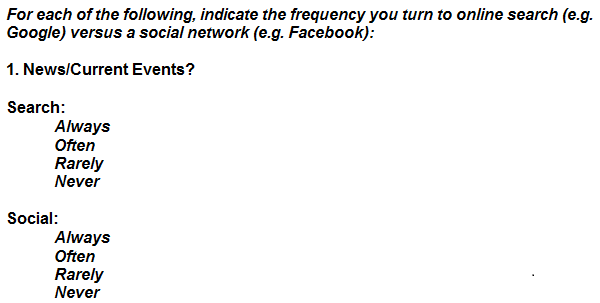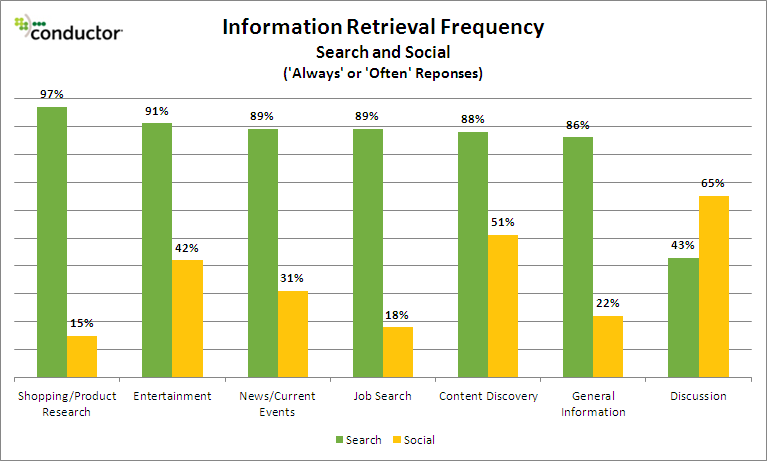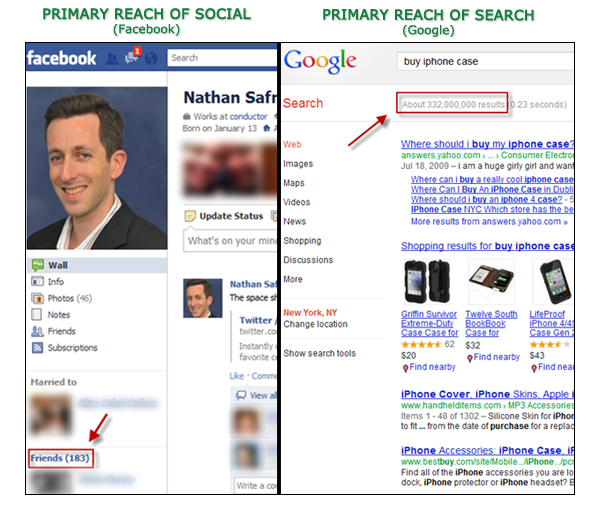The 50 Shades of Gray in Online Information Retrieval
- Industry News
- By Nathan Safran
- 6 minutes read
A long-rumored search engine from Facebook would pose no threat to Google. Conductor's new survey data supports the idea of contextual search.
CBS recently reported that Facebook is working on vastly improving what has long been poor search functionality on their ubiquitous social network. The article suggests that even given the $15 billion dollars at stake in search advertising, Facebook will not dive headfirst into battling Google by indexing the web:
Facebook is unlikely to go toe-to-toe with Google for algorithmic supremacy. While Google controls 67 percent of the search market in the U.S. and has sophisticated technology to track a trillion Web pages, Facebook employs few, if any, traditional search engineers, who typically have deep expertise in fields such as information retrieval and natural language processing.
In the aftermath, fueled by the increased attention on Facebook with their recent IPO, the tech industry wondered aloud if Facebook with vastly improved search functionality could spell a genuine threat to Google’s search dominance. With headlines such as “Facebook Patents ‘Curated Search’ To Attack Google ” and “Future Facebook Searches a threat to Google? ” speculation ran wild about the viability of a Facebook with improved search overtaking Google.
The question itself—whether a Facebook with improved search poses a genuine threat to Google’s online search dominance—presupposes, either implicitly or by implication, that online information retrieval is an either/or: either Facebook (social) triumphs as the medium consumers turn to for online information retrieval or Google (search) does. This assumption characterizes user information retrieval behaviors as black and white when in reality they are many shades of gray. Users’ information retrieval habits are contextual—they vary based on the context of what the user is searching for and, in turn, the platforms they use. With these assumptions in hand, we’d like to challenge the convention and postulate that Facebook will not be replacing Google any time soon.
Surveying How Users Retrieve Information Online
To test this assumption and gauge user behaviors, we surveyed a group of web users to determine how often they turn to social and search platforms for their online information needs. While our sample size of one hundred will not win any academic research awards, it should give us a sense of a user’s online information retrieval behaviors.
In a series of information retrieval situations, users were asked to indicate the frequency in which they turned to social (e.g. Facebook) and to online search (e.g. Facebook). For example, we asked:

Note that to measure their online information habits on search and social, users were queried about the frequency they turn to each independent of each other. For example, for content discovery, they could indicate they use “Search” Often and “Social” Often as well.
We asked users to indicate the frequency they turn to social and search in a number of retrieval scenarios, including :
- News/Current Events
- Shopping/Product Research
- General Information Retrieval (e.g. “height of the empire state building”)
- Entertainment/Local Events (e.g. restaurant recommendations, concerts, cultural events...)
- Job Search/Careers
- Discussion (talk about current events)
- Content Discovery (music, TV, movies...)
Users Overwhelmingly Turn to Search; Leverage Social in Specific Contexts
Looking at the responses, what immediately jumps out is that while search is the medium users turn to in nearly all information retrieval scenarios, with over 85% frequency in 6 out of 7 situations, there are specific contexts in which users will turn to social as well. Given that the core purpose of social networks is to communicate with others, it’s not surprising that ‘Discussion’ is the scenario in which users turn to social more often than search, but ‘Content Discovery’ and ‘Local Entertainment’ are also areas in which social media is strongly leveraged, with 51% and 42% frequency, respectively.
Interestingly, while we have long been told social will be huge for shopping (presumably because your friends’ purchase recommendations are more valuable than impersonal search listings), shopping is actually the scenario in which users use social networks the least, at 15%. Likewise, we might expect to see a large percentage of users heavily leveraging their social networks in a job search but only 18% of respondents to social ‘always or often’ turn.

A Narrow Solution to a Broad Problem
Time will tell if social is in fact the better option in many of these information retrieval scenarios, and the reason users have not yet turned to social is because behaviors have not yet changed. However, I think the way to interpret the data and part of the reason why users have not overwhelmingly turned to social in many of the scenarios we have been told they will do so in droves, is because social as a dominant information retrieval medium is a situation where theory actually differs significantly from practice.
The theory put forth is that social will start to replace search in many scenarios: Our friends’ shopping recommendations will be so meaningful in making purchase decisions it will start to trump search, it will be significant in a job search, etc. In practice, social may in fact be a narrow solution to what is often a broad problem.
According to Facebook , the average user has 190 friends. From the outset, the addressable audience is limited, and becomes even more so when we consider the percentage of friends who may be able to address a specific shopping recommendation request or help with a specific job search.
A narrow solution to what is often a broad problem.
(It has been reported that Facebook will start to take secondary connections into account should they in fact update their search functionality. That could mean when you search for Facebook for ‘iphone case’ you could end up with a recommendation from a non-primary friend. But in that case how would that differ from reading an Amazon review from a total stranger?)

Painting With A Pencil
There is no question social is a significant part of a user’s online discussion activities and their sharing and discovery of content online. But our data suggests that those who posit social will take over across all information retrieval scenarios are painting a broad picture with a narrow brush by extending social beyond its core uses—discussion, content discovery and local entertainment discovery — and misapplying it to nearly everything we do online. Time will tell, but for now, users utilize search universally while turning to social in certain specific contextual situations.
This article was originally featured at Search Engine Watch on June 19th, 2012.






